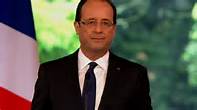French official’s visit part of Iran-backed bid to break Lebanese presidential impasse
Antoine Ghattas Saab| The Daily Star/Dec. 08, 2014
A senior French official arrived in Beirut Sunday night as part of an Iranian-backed initiative by Paris to help break the six-month-old presidential deadlock, diplomatic reports said.
The visit by Jean-Francois Giroux, the director of the French Foreign Ministry’s Middle East Department, comes straight after Russia’s Deputy Foreign Minister Mikhail Bogdanov ended a two-day trip to Beirut during which he had talks with rival Lebanese leaders, including Hezbollah chief Sayyed Hasan Nasrallah, on the presidential impasse, the Syrian crisis and regional developments,
Giroux’s visit comes as part of a flurry of political activity to be undertaken by some Western states aimed at creating conducive circumstances for the election of a new president as soon as possible by distancing Lebanon from regional conflicts, diplomatic sources said.
In addition to the French official’s visit, Federica Mogherini, the high representative of the European Union for foreign affairs and security policy, is scheduled to arrive here Tuesday for talks with Lebanese leaders on the presidential deadlock, the Syrian refugee crisis and cooperation between the EU and Lebanon.
Iran’s Parliament Speaker Ali Larijani is also expected to visit Beirut in the next two weeks.
Giroux’s visit is part of a regional tour that will also take him to Saudi Arabia, Iran and the Vatican for consultations on the Lebanese crisis, diplomatic reports said.
His talks with Lebanese leaders will focus on three inter-linked issues: first, electing a consensus president from a list of five candidates; second, approving a modern electoral law on whose basis parliamentary elections would be held; and third, the formation of a new national unity government in which all the parties would participate, the reports said.
They added that since these issues were interlinked, a solution could not be achieved except with the approval of the internal parties, as well as regional and international sponsors. The reports stressed that the French initiative came at Iran’s request.
In order to break the presidential stalemate, political and diplomatic sources said Lebanon’s crisis should be separated from the negotiations between Western powers and Iran over Tehran’s nuclear program, the ongoing talks over the Syrian war and the Iraq crisis, and Saudi-Iranian relations, even though there is a new atmosphere signaling that Riyadh and Tehran are in agreement on the importance of electing a president for Lebanon.
The Vatican is playing a key role with Saudi Arabia and Iran to help finalize a solution for the presidential crisis based on two factors: prevention of Lebanon’s drift toward a comprehensive vacuum and total chaos if something happened and led to the resignation of the current government; and the strengthening of the Lebanese political system to prevent its disintegration at a time when efforts are underway in more than one regional state to find democratic systems similar to the Lebanese one, the sources said.
The majority of the political class in Lebanon has become convinced that linking the presidential crisis to a political settlement in Syria or in the region is no longer realistic. Lebanese leaders have heard it directly from Bogdanov that there will be no solution to the Syrian crisis unless the regime and the opposition sit together at the negotiation table without preconditions. The Russian official also urged Lebanese leaders he met to engage in an internal dialogue on the presidency, the next government and parliamentary elections.
Similarly, the same sources said that the launch of the planned dialogue between the Future Movement and Hezbollah would constitute an internal platform to kick off a draft agreement on a president with Christian blessing as part of a regional deal in which all the Lebanese factions would participate at a later stage.
In tandem with the Western diplomatic activity in Lebanon, Prime Minister Tammam Salam is scheduled to visit France on Dec. 10-12 for talks with President Francois Hollande and other senior French officials on the Lebanese crisis and regional developments.
It will be Salam’s first visit to France as prime minister since he met Hollande on the sidelines of the U.N. General Assembly’s meetings in New York in September.
Salam is expected have discussions with French Defense Minister Jean-Yves Le Drian about military cooperation between the two countries, and a $3 billion Saudi gift to equip the Lebanese Army with French weapons, an official source said.
The Lebanese-French talks will focus on the presidential election, bilateral issues, including assistance to the Lebanese Army, French aid to several development projects in Lebanon through the French Agency for Development and the Syrian refugee crisis. Salam will be accompanied by Deputy Premier and Defense Minister Samir Moqbel, Foreign Minister Gebran Bassil and a number of advisers.




















